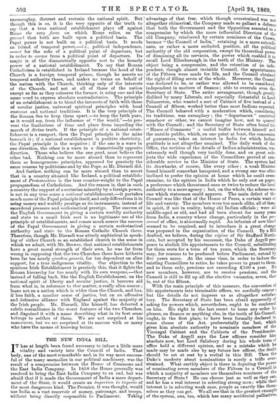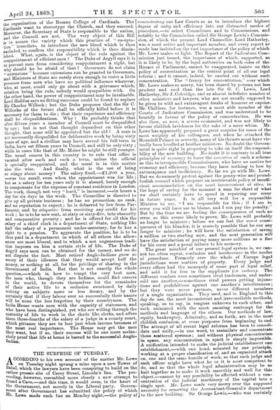THE NEW INDIA BILL.
IT has at length been found necessary to infuse a little more vitality and variety into the Council of India. That body, one of the most remarkable and, in its way most successful of the many anomalies in our political machinery, was the result of a compromise between the House of Commons and the East India Company. In l858 the House generally was resolved to bring the East India Company to an end, but was afraid that if it made the Government of India a mere department of the State, it would create an imperium in imperio of the most dangerous kind. The Premier, it was thought, would use India as a vast reservoir of money, patronage, and troops, without being directly responsible to Parliament. Taking advantage of that fear, which though overstrained was not altogether chimerical, the Company made so gallant a defence that both the Government and the Opposition assented to a compromise by which the more influential Directors of the old Company, reinforced by certain nominees of the Crown, became "the Council of India," retaining in a more subordt_ nate, or rather a more secluded, position, all the political authority of the old corporation, except its theoretical power of dismissing all its servants, the power which enabled it to recall Lord Ellenborough in the teeth of the Ministry. Tee object being a compromise, and the retention of an independent, though almost invisible Council, the appointments of the Fifteen were made for life, and the Council obtained the right of filling seven of the whole. Moreover, the Council was declared to be, or rather was allowed to be considered, independent in matters of finance ; able to overrule even the Secretary of State. The entire arrangement, though greatly disliked by many Liberals, and especially distasteful to Lord Palmerston, who wanted a sort of Cabinet of five instead of a Council of fifteen, worked better than most Indians expected, The Council behaved with a moderation which, considering its traditions, was exemplary ; the " department " contrived somehow or other, we cannot imagine how, not to quarrel with the Council ; and the Secretary of State often found his "House of Commons" a useful buffer between himself and the outside public, which, on one point at least, the concession of guarantees, takes an interest in India for which Indian gratitude is not altogether unmixed. The daily work of the Office, the revision of the details of Indian administration, was extremely well though very tardily done, and on great subjects the wide experience of the Councillors proved of considerable service to the Minister of State. The system had its drawbacks, of course, like every other ; a weak Minister found himself somewhat hampered, and a strong one was often inclined to prefer the opinion at home which he could crossexamine, to the opinion in India which he only saw on paper, a preference which threatened once or twice to reduce the local authority to a mere agency ; but, on the whole, the scheme was one which statesmen could approve. The main defect of the Council was like that of the House of Peers, a certain want of life and variety. The members were too much alike, all of them in spirit, if not in reality, being old Indian officials ; were all middle-aged or old, and had all been absent for many years from India, a country where change, particularly in the personnel of office, is abnormally rapid. An infusion of new blood seemed to be required, and to introduce it a great change was proposed in the organization of the Council. By a Bill drafted, we believe, during the regime of Sir Stafford Northcote, but accepted by his successor, the Duke of Argyll proposes to abolish life appointments to the Council, substituting for them seats for a term of ten years, which the Secretary may, for reasons to be produced before Parliament, extend by five years more. At the same time, in order to induce the existing Councillors to retire, he takes power to grant to them, and to them only, pensions not exceeding £500 a year. No' new members, however, are to receive pensions, and the Council is still to fill up all the elective vacancies, seven, that is, out of the fifteen. With the main principle of this measure, the conversion of life appointments into terminable offices, we cordially concur ; but the details do not impress us as altogether satisfactory. The Secretary of State has been afraid apparently of asking for powers which, nevertheless, ought to be conferred on him. His right in the last resort to issue any order he pleases, on finance or anything else, in the teeth of his Council, ought, in the first place, to have been formally declared in some clause of the Act, preferentially the last which gives him absolute authority to -nominate members of the Viceregal Cabinet and the Cabinets of the Presidencies. The Duke of Argyll says the Law officers consider him absolute now, but Lord Salisbury during his whole term of office held a different opinion, and as a mistake -which he made may be made also by any future law officer, the doubt should be set at rest by a recital in this Bill. Then the Duke's modesty about nominations is surely a trifle overstrained. What earthly object is there in deputing the power of nominating seven members of the Fifteen to a Council in which a majority of members are themselves nominees of the Secretary of State? He can choose just as well as they co, and he has a real interest in selecting strong men; while their interest is in selecting weak ones, people as exactly hire themselves as they can get. We all see that in the greeted example of the system, one, too, which has many accidental palliatives, the organization of the Roman College of Cardinals. The cardinals want to stereotype the Church, and they succeed. Moreover, the Secretary of State is responsible to the nation, and the Council are not. The very object of this Bill is to secure the variety which this practice of " co-optation " interdicts, to introduce the new blood which is thus excluded, to confirm the responsibility which is thus diminished. What, again, is the object of the rule against the reappointment of efficient men ? The Duke of Argyll says it is to prevent men from considering reappointment a right, but why should he be afraid of that ? Governors do not claim " extensions "because extensions can be granted to Governors, and Ministers of State are surely stern enough to resist a little pressure from men who have no political influence whatever, who, at most, could only go about with a grievance which, rotation being the rule, nobody would sympathize with. On the other hand, the power of reappointment may be invaluable. Lord Halifax says no fitting successor could be found to replace Sir Charles Willock ; but the Duke proposes that the Sir C. Willocks of the fixture shall be officially killed before it is necessary for them to die ; that their experience and efficiency shall be disqualifications. Why ? He probably thinks that after fifteen years a member of Council must be disqualified by age ; but is not that thought dependent on this other thought, that none will be appointed but the old ? A man is not necessarily disqualified for deliberative work by being sixty years of age, and a civilian may have served his full term in India, have sat fifteen years in Council, and still be only sixty ; while in eases like that of Mr. Maine he might be still younger. The usual course in this country is to rule that office is vacated after such and such a term, unless the official is specially reappointed, and the usual is in this matter also the wise. And finally, what is the use of being so stingy about money ? The salary fixed,—£1,200 a year, —was too small, even when the appointment was for life ; but as a salary for ten years only it is absurd, barely enough to compensate for the expense of constant residence in Loudon. The work, though not very "hard," is incessant,—six hours a day for six days in the week. The Councillor is directed to give up all private business ; he has no promotion, no rank, and no reputation to expect ; he is debarred by law from Parliament, and by etiquette from receiving any credit for his work ; he is to be now sent, at sixty or sixty-five, into obscurity and comparative poverty ; and he is offered for all this the salary of a chief clerk in a department of State, nothing like half the salary of a permanent under-secretary, for he has a right to a pension. To aggravate the position, he is to be thus paid in a department in which of all others the allowances are most liberal, and in which a not ungenerous tradition imposes on him a certain style of life. The Duke of Argyll says men can be obtained for the money, and we do not dispute the fact. Most retired Anglo-Indians grow so weary of their idleness that they would accept half the money, or nothing at all, for the privilege of sharing in the Government of India. Bat that is not exactly the whole question,—which is, how to tempt the very best men, the men who, though they are Indians, could find careers In the world, to devote themselves for the remainder of their active life to a seclusion sweetened by daily writing on subjects more or less dreary, and by the certainty that if they labour ever so successfully their names will be none the less forgotten by their countrymen. The India House wants men with the capacity of statesmen, and who have been distinguished, yet who are willing through the maturity of life to work in the shade like clerks, and offers them three-fourths of the salary of a judge in a county court, which pittance they are to lose just when income becomes of the most real importance. The House may get the men they want, but if so, their success will be one more melancholy proof that life at home is barred to the successful Anglo
Indian.































 Previous page
Previous page